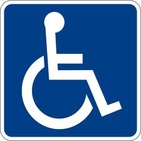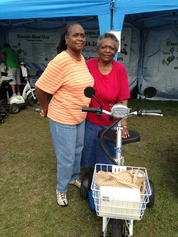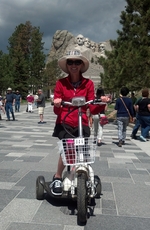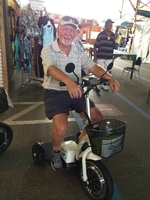Does the EMU Trike® qualify as an OPDMD?
ABSOLUTELY!
According to ADA.gov, An OPDMD is any mobility device powered by batteries, fuel, or other engines that is used by individuals with mobility disabilities for the purpose of locomotion, whether or not it was designed primarily for use by individuals with mobility disabilities.
OPDMDs may include golf cars/carts, electronic personal assistance mobility devices, such as the Segway ® Personal Transporter (PT), or any mobility device that is not a wheelchair and is designed to operate in areas without defined pedestrian routes.


Not only is the EMU Trike® considered by most to be safer and easier to maneuver than the Segway, it is also less than a third of the cost! The Segway starts around $6,000 and although they can be a lot of fun, they are certainly not for everyone. Our EMU Trike® is ideal for ALL and so affordable too!
Are public and private entities obligated to allow me on their property with my EMU Trike®?
 According to www.ada.gov, Public and private entities must make reasonable modifications in their policies, practices, or procedures to permit individuals with mobility disabilities to use OPDMDs, unless the entity can demonstrate that the class of OPDMDs cannot be operated in accordance with legitimate safety requirements adopted by the entity.
According to www.ada.gov, Public and private entities must make reasonable modifications in their policies, practices, or procedures to permit individuals with mobility disabilities to use OPDMDs, unless the entity can demonstrate that the class of OPDMDs cannot be operated in accordance with legitimate safety requirements adopted by the entity.
So technically, yes…they ARE obligated to allow any OPDMD on their property unless they can demonstrate that the unit causes safety concerns to other people, damage to the property’s environment or harm to local natural resources, etc. For a clearer understanding of this explanation the ADA continues…
The decision about allowing a particular OPDMD in a specific facility or area depends on the following:
- The type, size, weight, dimensions, and speed of the device.
- The facility’s volume of pedestrian traffic (which may vary at different times of the day, week, month, or year).
- The facility’s design and operational characteristics (e.g., whether its service, program, or activity is conducted indoors; its square footage; the density and placement of stationary devices; and the availability of storage for the device, if requested by the user).
- Whether legitimate safety requirements can be established to permit the safe operation of the OPDMD in the specific facility.
- Whether the use of the OPDMD creates a substantial risk of serious harm to the immediate environment or natural or cultural resources, or poses a conflict with Federal land management laws and regulations.
Is an officer, security guard or property staff allowed to ask me about my disability?
According to www.ada.gov, “Entities may not ask an individual using a wheelchair or OPDMD about the nature or extent of his or her disability.” “They may, however, ask a person using an OPDMD to provide a credible assurance that the mobility device is required because of a mobility disability, by either:
This means they cannot ask you things like “What KIND of disability do you have?” or “Exactly how debilitating IS your disability?” or “Why do you need to use a scooter when I just saw you walk into the bathroom?”, etc. These are very personal questions and should not be of concern to anyone but you and your doctor. Once your doctor confirms your disability status, you receive a disability card, placard or license, which you should keep with you at all times. |
If you’d like to know more about your rights, click on the PDF icon below to download and print the Department of Justice OPDMD policy. |

The EMU Trike® is ideal for those with and without mobility issues and can be enjoyed almost anywhere! For our customers who use the EMU Trike™ for non-disability purposes, most states agree that it falls under the same regulations as a bicycle or is considered an EPAMD (Electric Personal Assistive Mobility Device).
The Florida Statute 316.2068 regarding EPAMD regulations states the following:
s. 316.2068 – Electric Personal Assistive Mobility Devices; Regulations
(1) An electric personal assistive mobility device, as defined in s.316.003, may be operated:
 (a) On a road or street where the posted speed limit is 25 miles per hour or less.
(a) On a road or street where the posted speed limit is 25 miles per hour or less.
(b) On a marked bicycle path.
(c) On any street or road where bicycles are permitted.
(d) At an intersection, to cross a road or street even if the road or street has a posted speed limit of more than 25 miles per hour.
(e) On a sidewalk, if the person operating the device yields the right-of-way to pedestrians and gives an audible signal before overtaking and passing a pedestrian.
(2) A valid driver license is not a prerequisite to operating an electric personal assistive mobility device. 
(3) Electric personal assistive mobility devices need not be registered and insured in accordance with s.320.02.
(4) A person who is under the age of 16 years may not operate, ride, or otherwise be propelled on an electric personal assistive mobility device unless the person wears a bicycle helmet that is properly fitted, that is fastened securely upon his or her head by a strap, and that meets the standards of the American National Standards Institute (ANSI Z Bicycle Helmet Standards), the standards of the Snell Memorial Foundation (1984 Standard for Protective Headgear for Use in Bicycling), or any other nationally recognized standards for bicycle helmets which are adopted by the department.
(5) A county or municipality may regulate the operation of electric personal assistive mobility devices on any road, street, sidewalk, or bicycle path under its jurisdiction if the governing body of the county or municipality determines that regulation is necessary in the interest of safety. 
(6) The Department of Transportation may prohibit the operation of electric personal assistive mobility devices on any road under its jurisdiction if it determines that such a prohibition is necessary in the interest of safety.
NOTE: Emu Trike® owners live all over the country. Please be sure to check your state’s own statutes and policies.
Disclaimer Liability:
- All content is subject to copyright and may not be reproduced in any form without express written consent of American Scooter Company LLC.
- While American Scooter Company LLC strives to make the information on this website as accurate as possible, American Scooter Company LLC makes no claims, promises, or guarantees about the accuracy, completeness, or adequacy of the contents of this site, and expressly disclaims liability for errors and omissions in the contents of this site.
- American Scooter Company LLC disclaim liablity for the content that is linked from with this website, American Scooter Company LLC will not be held responsible for the content on all the other websites to which you link from this site.